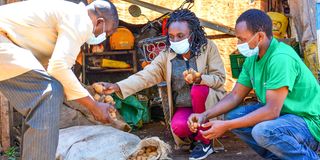Building rural resilience for women farmers

Lenah Mwangi from Nakuru County advising a farmer on quality requirements of potato seed.
What you need to know:
- Data recently published by the National Bureau of Statistics highlights the disparity between those living in rural and urban settings.
- Lenah Mwangi, from Nakuru County began as a trainer of trainers (TOT) when she joined the Farm to Market Alliance (FtMA) in 2018.
- In 2019, her best daily sales would range from Sh2,000 to Sh5,000; after the training and credit support, her sales grew to Sh30,000, and this grows to Sh40,000 during the peak planting seasons.
- Flomena Tendet lives in Uasin Gishu County, operating a small subsistence farm which produces avocados, eucalyptus and pine nuts.
- Tecla Chumba of the Lembus tribe set up a community forest association and asked the Kenya Forest Service to give each member half an acre of land and tree seedlings that they could plant, alongside their own crops.
Data recently published by the National Bureau of Statistics highlights the disparity between those living in rural and urban settings. It further highlights that women in rural settings are significantly less empowered when it comes to education, employment and health.
Increasing the empowerment of rural women is priority at the international level and that is why institutions like the United Nations place primacy on supporting women in agriculture.
Below are some examples of how rural women can be empowered and their value to the country’s society as a whole.
From Sh2,000 to Sh30,000
Lenah Mwangi, from Nakuru County began as a trainer of trainers (TOT) when she joined the Farm to Market Alliance (FtMA) in 2018. The alliance was set up by six agri-focused organisations, including the UN’s World Food Programme, to build resilient value chains and link up public and private sectors.
“I started by buying pesticides which I would sell to my neighbours. I got my customers by word of mouth. I also introduced my mother to the modern way of farming, though it was difficult at first because she was used to the traditional methods, she began embracing it when she saw my yield grow,” she says.
“This increased my customer base as neighbours wanted to learn modern farming methods. In March 2020, I joined a co-financing partnership to refurbish and restock my agrovet shop. I contributed Sh20,000 to the required Sh120,000 and the rest came from FtMA,” says a gleeful Ms Mwangi.
Ms Mwangi is an FtMA Farmer Service Centre (FSC). In 2019, FtMA introduced the FSC model, where these centres act as key hubs in the farming community, run by rural entrepreneurs, aggregators, farmer groups or cooperatives and serving approximately 200 farmers each.
“In 2019, my best daily sales would range from Sh2,000 to Sh5,000, and I would feel I have really achieved a lot. However, after the training and credit support, my daily sales grew and today, I clock in around Sh30,000, and this grows to Sh40,000 during the peak planting seasons. This year has actually been the best for me, especially in the planting seasons of April and May, as I earned a profit of Sh40,000,” says Ms Mwangi.

Flomena Tendet, 38, operates a subsistence farm of around 0.2 acres, 30km from Eldoret.
Last year, UN Women partnered with Kenya’s Agricultural Finance Corporation to deliver a series of training sessions around the country for grassroots women farmers. The lack of information available to women, coupled with traditional norms severely limit their ability to own land and have build their own economic independence.
Flomena Tendet lives in Uasin Gishu County, operating a small subsistence farm which produces avocados, eucalyptus and pine nuts. She is married and although her husband’s name is on the title deeds of the land, the ownership of the business is shared. She explains that this shared partnership is not necessarily common in the region.
“Women traditionally do not own titles here which causes problems. I was renting land, but I had to give back to the landowner before my project of crops was finished. I trained women in Mount Elgon but here it is not so receptive; traditions do not allow for it. Many women are not aware of the opportunities to access credit,” she says.
“Many things are secretive, people are not open to tell you training courses, like this, are happening. This is the first training I have attended – I moved here in 2005. The information does not reach women. Some men believe women will become arrogant towards the husband if they receive training.”
Raising awareness of credit opportunities and developing their business and administrative skills are the building blocks for women to gain economic empowerment.

Ms Tecla Chumba accompanied by a resident plant a tree on a land acquired from the Kenya Forest Service for farming and tree planting.
Rural women are the backbone of Kenya’s society and can be relied upon to protect their communities. Tecla Chumba of the Lembus tribe set up a community forest association and asked the Kenya Forest Service to give each member half an acre of land and tree seedlings that they could plant, alongside their own crops.
But when the Kenya Forest Service decided to advertise to lease the land to a company interested in planting and harvesting trees, denying the community forest association the right to do shamba, Ms Chumba (together with the National Alliance of Community Forests Associations Kenya) took the Kenya Forest Service to court – and won.
“Local communities have to be involved in decisions about forests that affect their livelihoods. The Kenyan Forest Management and Conservation Act 2016, says that Kenya Forest Service has to respect public participation,” says Ms Chumba from Narok County.
Communities like Ms Chumba’s are supported by the United Nations Programme on Reducing Emissions from Deforestation and Forest Degradation, which aims to bring a human rights-based approach to environmental policies.




